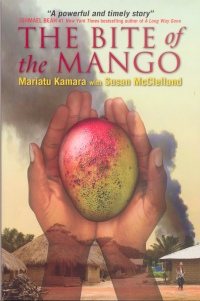| ________________
CM . . .
. Volume XV Number 5. . . .October 24, 2008
excerpt:
The Bite of the Mango is the true story of Mariatu Kamara, a girl born in Sierra Leone. At the age of 12, Mariatu had her hands amputated by boy-rebel soldiers. And there begins the tale. It is a horrifying, astonishing and painful read, but that's not all. Thanks to the careful writing of journalist Susan McClelland, it is not a catalogue of misery. Rather, it's a story told with equal measures of compassion and detachment that allows the reader to be both shocked and locked in. It's good, really good. The story begins in Sierra Leone, an impoverished country on the West Coast of Africa, once the battleground of a horrific civil war played out mainly in the rural areas. Despite the poverty in her tiny rural village, Mariatu's first few years are happy ones, filled with friends, games and chores. The preamble to the attack can be a bit confusing. Mariatu's father has two wives, neither of whom seems very pleasant. Mariatu is given to an auntie to raise, which likely would have been a great idea had the village not been attacked by rebels. The ensuing assault will leave the reader breathless. It's enough to say that her hands are taken off. Bleeding and traumatized, stumbling and lurching, Mariatu makes the heart-wrenching journey to a hospital. There she sits amongst a multitude of limbless children and adults -- the image is almost too much to bear. Mariatu is cared for and, as time goes by, gives birth to a baby. The infant eventually dies. For an author tackling this subject, the first challenge would be to get a handle on the extreme violence that could make the book completely unsuitable for a Canadian school audience. Without a doubt, some readers will feel it is too much, too hard. Most, I hope, will see the overall value of enlightening and informing our kids, of extending their compassion and understanding. That said, any astute reader with even a cursory knowledge of Africa would know that much of the actual violence has been edited out. The second challenge to the author is that the action in the book is front-loaded – it all happens within the first 40 pages. After the attack, the story is no longer a tale of assault, of physical survival, of child soldiers lurking in the bush. Instead, it becomes a personal journey of a girl finding her voice, trusting that voice and making her way in the world. Ultimately Mariatu is simply a teenage girl with teenaged hopes, dreams and demands. (She lands in England at considerable expense and effort then demands to go home because she doesn't like the weather. Teenage angst and stubbornness comes into play.) Mariatu loves getting her hair done and buying clothes. Somehow or other she puts on her own make-up. It's almost possible to forget that she has no hands. One can't say, "I love this book." The topic is too daunting, too savage - a level of barbarism that might cause even Hitler to pause. (I said might.) I found I had to put the book down a few times, take a breath, and start again. And yet, the hope and the challenges Mariatu overcomes, the dogged belief that her life is not over and has value, trumps the violence ten times over. As for the writing style and quality, we have seen adult fiction writers, journalists of all stripes, and movie stars tackle children's writing with the assumption that anyone can do it. Most fail miserably. Journalist Susan McClelland bursts out of the gate as a sensitive, articulate young adult writer who can separate emotional tripe from story telling. She gets it. McClelland is a welcome addition to the young adult stable of writers. One can hope that she pauses in this genre for awhile. As for beautiful Mariatu, she is now 21, a student and about to embark on a speaking tour as a UNICEF Special Representative. Amazing. Highly Recommended. Sharon E. McKay is an author of books for children and adolescents. Her most recent novel is War Brothers.
To comment
on this title or this review, send mail to cm@umanitoba.ca.
Copyright © the Manitoba Library Association. Reproduction for personal
use is permitted only if this copyright notice is maintained. Any
other reproduction is prohibited without permission.
NEXT REVIEW |
TABLE OF CONTENTS FOR THIS ISSUE
- October 24, 2008.
AUTHORS |
TITLES |
MEDIA REVIEWS |
PROFILES |
BACK ISSUES |
SEARCH |
CMARCHIVE |
HOME |
